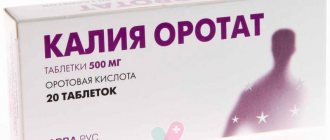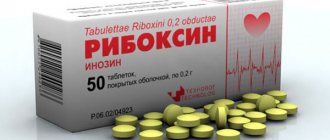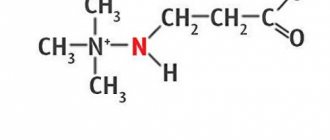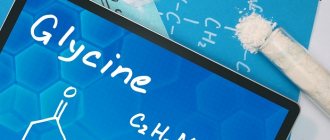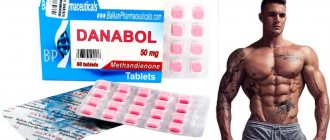A deficiency of potassium and magnesium in the human body can lead to very serious health problems. These minerals can be replenished through proper nutrition, but this process is not so fast, and it is not always possible to follow a diet and lead a healthy lifestyle. A wonderful simple and inexpensive drug - asparkam - will help replenish the supply of potassium and magnesium in the body. This drug plays, although indirectly, an important role in the development of the athlete’s muscles due to the regulation of protein metabolism. Asparkam is also relevant for athletes to eliminate dehydration and as a complex drug for the recovery of an athlete after using anabolic steroids.
What kind of drug is this
Asparkam is a drug consisting of potassium and magnesium aspartate, as well as aspartic acid. It regulates metabolic processes in the body. The action of the drug is aimed at replenishing potassium and magnesium, normalizing electrolyte balance. The drug is used for arrhythmia, ischemia (angina) of the heart, as well as for the prevention of stroke. Another remedy is used when seizures occur. Due to aspartic acid, the rapid transfer of potassium and magnesium into cells is carried out. Asparkam is also used in sports.
In general, asparkam has a positive effect on electrolyte metabolism, reduces excitability, conductivity and metabolism of the myocardium, and normalizes heartbeat. The drug stimulates the synthesis of ATP, carbohydrates, amino acids and lipids.
The drug is activated very quickly. The concentration of potassium and magnesium in the blood reaches a maximum 1-2 hours after taking the drug.
Effect of taking
Asparkam helps to normalize metabolic processes occurring in the human body. The basis of this drug is composed of substances such as potassium aspartate and magnesium aspartate. Potassium promotes proper metabolism in the body. Asparkam improves the process of increasing muscle mass, and also reduces the body's fatigue during training, which has a positive effect on the athlete's endurance during training. Magnesium is involved in protein metabolism, which also affects the process of building muscle mass. Athletes take asparkam to reduce their body weight by ridding the body of excess fluid and subcutaneous fat. During training, the athlete consumes a large volume of fluid, which removes magnesium and potassium from the body. In this regard, it is necessary to replenish the body with these microelements, and aspark is the source.
Why is asparkam used in bodybuilding?
Often bodybuilders are faced with a lack of strength during training or overtraining, as a result of which the functioning of the body is disrupted and the quality of life in general deteriorates. Asparkam effectively relieves symptoms and protects the athlete’s organs (cardiovascular system) from factors that negatively affect it.
- The drug is often used by athletes to restore heart rhythm, the disturbance of which occurs due to dehydration.
- Aspark is necessary for athletes during drying, since due to a salt-free diet, potassium and magnesium are not replenished and are washed out of the body.
- The drug makes it possible to train longer and improves performance.
- Regulates protein metabolism.
- Used as a complex therapy drug for maladaptation (overtraining).
Adverse reactions and overdose
Non-standard symptoms appear in exceptional cases. Treatment with Asparkam can provoke:
- attacks of nausea with vomiting, dyspepsia, pain in the epigastric region, bleeding and ulcers of the gastrointestinal tract, drying of the mucous membranes in the oral cavity;
- problems with myocardial conduction, drop in blood pressure, atrioventricular block;
- convulsive states, sensitivity disorders with tingling and sensations of ants moving on the skin, decreased sensitivity of muscles to irritants;
- hyperemia of the facial dermis, skin rashes, obsessive itching;
- respiratory depression due to excess magnesium, hot flashes.
Clinical studies have not shown the presence of overdoses. If the recommended volume of the drug is accidentally increased, non-standard symptoms may appear:
- attacks of vomiting with nausea, digestive disorders;
- pain in the abdomen, the appearance of a metallic taste in the mouth;
- slow heartbeat, weakness, spatial disorientation;
- muscle paralysis, decreased sensitivity of the limbs;
- hyperemia of the facial skin, constant thirst;
- drops in blood pressure, disturbances in neuromuscular transmission, decreased muscle sensitivity;
- arrhythmic and convulsive conditions.
Symptomatic treatment consists of intravenous administration of calcium chloride. In difficult cases, the patient is sent for hemodialysis.
How to take the drug asparkam: dosages
An important point is monitoring potassium and magnesium in the blood during long-term use of the drug, as well as electrocardiogram and blood pressure. The drug may lower blood pressure.
Asparkam is taken in a course not exceeding 1 month. The dosage should be selected individually. According to the instructions, you need to take asparkam three times a day, 1-2 tablets after meals. It is best to take the medicine with plenty of water.
No overdose of asparkam was detected. Often bodybuilders exceed the daily dose of 6 tablets, but the excess ions are excreted in the urine. This drug can be combined with any sports nutrition products. Asparkam is relevant when coming out of drying.
Composition, indications and contraindications for therapy with Asparkam
The instructions for the drug indicate the following components:
- magnesium aspartate – 175 mg;
- potassium aspartate – 175 mg;
- corn starch;
- calcium salt and stearic acid;
- food additive E433;
- talc.
The weight of one tablet is 0.5 g.
Asparkam is a source of potassium with magnesium and is prescribed to patients with chronic cardiac pathologies, including insufficient organ functionality and the period after a heart attack, with arrhythmias. The medication complements therapy with digitalis preparations.
The medication is prohibited for use under certain conditions:
- for acute and chronic renal dysfunction;
- hypocorticism;
- 2-3 degrees of atrioventricular block;
- left ventricular failure and a drop in blood pressure below 90 units.
Asparkam is not prescribed to patients with individual intolerance to the component composition.
Action of asparkam
The drug, according to numerous clinical trials, demonstrates high effectiveness during the period of active training of athletes.
The use of the medication by bodybuilders has the following effects:
- metabolic processes occurring in the myocardium and coronary circulation are improved, and the overall excitability of the middle muscular layer of the heart is reduced;
- the effect of cardiac glycosides weakens;
- nucleotides, amino acids, aminosaccharides and nitrogen-containing lipids begin to be produced more intensively;
- electrolyte levels stabilize.
Each effect of asparkam is confirmed by many studies and experiments.
Reviews
The drugs are popular, but mainly in the CIS. Bodybuilders in the United States stopped taking Riboxin and Asparkam in the late eighties, as they were able to use modern supplements and analogues. This example was followed a little later by athletes from Western European countries. This does not apply to Eastern Europe. Both drugs are effective and available. They are much cheaper than many analogues. Each athlete decides for himself what to take - modern supplements or Riboxin with asparkam, since it all depends on preferences and capabilities.
Igor September 4, 2017
Modern Pharmaceuticals of Russia
Asparkam, tablets 175 mg + 175 mg
Trade name: Asparkam International non-proprietary or generic name:
Potassium and magnesium aspartate.
Dosage form:
Tablets
Description:
Round flat-cylindrical tablets of white color with a chamfer and a score.
ATC code:
A12СХ
Pharmacotherapeutic group:
Potassium and magnesium preparation.
Pharmacological action:
The most important intracellular cations of potassium (K+) and magnesium (Mg++) play a key role in the functioning of numerous enzymes, in the formation of bonds between macromolecules and intracellular structures and in the mechanism of muscle contractility.
The intra- and extracellular ratio of potassium, calcium, sodium and magnesium ions affects myocardial contractility. Endogenous aspartate acts as a conductor of ions: it has a high affinity for cells, due to the slight dissociation of its salts, ions in the form of complex compounds penetrate into the cell. Magnesium aspartate and potassium aspartate improve myocardial metabolism. Lack of magnesium/potassium predisposes to the development of arterial hypertension, atherosclerosis of the coronary arteries, arrhythmias and metabolic changes in the myocardium. Pharmacokinetics
Potassium and magnesium aspartates are intensively absorbed in the intestine, mainly in the small intestine.
Excreted by the kidneys. Indications for use:
To eliminate potassium and magnesium deficiency as part of combination therapy for various manifestations of coronary heart disease (including acute myocardial infarction);
chronic heart failure; heart rhythm disturbances (including arrhythmias caused by an overdose of cardiac glycosides). Contraindications:
Hypersensitivity to any of the constituent components of the drug, acute and chronic renal failure, hyperkalemia, hypermagnesemia, Addison's disease, atrioventricular block I-III degree, shock (including cardiogenic) (blood pressure less than 90 mm Hg), violation amino acid metabolism, myasthenia gravis, hemolysis, acute metabolic acidosis, dehydration state, age under 18 years (efficacy and safety have not been established).
With caution:
Pregnancy (especially in the first trimester of pregnancy) and breastfeeding.
Use during pregnancy and breastfeeding:
Use is possible if the potential benefit to the mother outweighs the possible risk to the fetus.
Potassium and magnesium aspartate passes into breast milk.
If it is necessary to take the drug during breastfeeding, breastfeeding should be stopped. Directions for use and dosage:
Before use, you should consult your doctor.
Take orally, without chewing and with plenty of water.
Asparkam should be taken after meals, because... the acidic environment of the stomach reduces its effectiveness.
Adults are prescribed 1-2 tablets 3 times a day.
The course of treatment is 3-4 weeks. If necessary, the course is repeated. Side effects:
Possible nausea, vomiting, diarrhea, discomfort or burning sensation in the epigastric region (in patients with anacid gastritis or cholecystitis), atrioventricular block, paradoxical reaction (increased number of extrasystoles), hyperkalemia (nausea, vomiting, diarrhea, paresthesia), hypermagnesemia (facial redness, thirst, decreased blood pressure, hyporeflexia, respiratory depression, convulsions).
Overdose
The risk of symptoms of hyperkalemia and hypermagnesemia increases.
Symptoms of hyperkalemia:
increased fatigue, myasthenia gravis, paresthesia, confusion, heart rhythm disturbances (bradycardia, atrioventricular block, arrhythmias, cardiac arrest).
Symptoms of hypermagnesemia:
decreased neuromuscular excitability, nausea, vomiting, lethargy, decreased blood pressure.
With a sharp increase in the content of magnesium ions in the blood: inhibition of deep tendon reflexes, respiratory paralysis, coma. Treatment: symptomatic therapy - intravenous administration of calcium chloride at a dose of 100 mg/min, if necessary - hemodialysis. Interaction with other drugs:
Pharmacodynamic interactions.
When used together with potassium-sparing diuretics (triamterene, spironolactone), beta-blockers, cyclosporine, heparin, angiotensin-converting enzyme (ACE) inhibitors, and non-steroidal anti-inflammatory drugs, the risk of developing hyperkalemia up to the development of arrhythmia and asystole increases. The simultaneous use of potassium supplements with glucocorticosteroids eliminates the hypokalemia caused by the latter. Potassium reduces the undesirable effects of cardiac glycosides. Asparkam enhances the negative dromo- and bathmotropic effects of antiarrhythmic drugs. Magnesium reduces the effects of neomycin, polymyxin B, tetracycline and streptomycin. Anesthetics increase the inhibitory effect of magnesium preparations on the central nervous system; when used simultaneously with atracuronium, decamethonium, succinyl chloride and suxamethonium, neuromuscular blockade may be enhanced. Calcitriol increases the content of magnesium in the blood plasma, calcium supplements reduce the effects of magnesium supplements.
Pharmacokinetic interaction.
Medicines that have an astringent and enveloping effect reduce the absorption of magnesium and potassium aspartate in the gastrointestinal tract, therefore it is necessary to maintain a three-hour interval between oral administration of Asparka with the above medications.
Special instructions:
Patients with diseases accompanied by hyperkalemia require special attention: regular monitoring of potassium levels in the blood plasma is necessary.
Effect on the ability to drive vehicles and machinery:
No studies have been conducted.
No effect is expected on the ability to drive vehicles or operate mechanisms that require increased concentration and speed of psychomotor reactions. Release form:
Release form. Tablets, 175 mg + 175 mg.
8, 10, 20, 25 tablets in a blister pack (blister) made of polyvinyl chloride film and aluminum foil.
10 tablets in a contour-free packaging made of polyethylene-coated packaging paper.
50, 100 tablets in polyethylene jars.
Labels made of label or writing paper or labels made of self-adhesive paper are glued onto polyethylene cans.
1, 2, 3, 4, 5, 6, 7, 8, 9 or 10 contour packages or 1 polyethylene jar together with instructions for medical use are placed in a box of cardboard.
It is allowed to pack 500, 700 or 1000 contour packages together with an equal number of instructions for medical use in corrugated cardboard boxes (for hospitals).
Storage conditions:
At a temperature not exceeding 25 °C.
Keep out of the reach of children. Shelf life:
3 years.
Do not use the drug after the expiration date indicated on the package.
Dispensing conditions:
Without a prescription.
Athletes' opinions
Reviews about the drug asparkam are mostly positive, since it acts on the body quickly, effectively, and does not cause harm. The effect of the drug corresponds to those indicated in the annotation. The product is not a miracle supplement, but it replenishes mineral deficiencies in the body, promoting recovery and increasing endurance. Also attractive is the affordable price and ease of administration. Therefore, most bodybuilders and athletes take these pills when cutting or gaining muscle mass.
